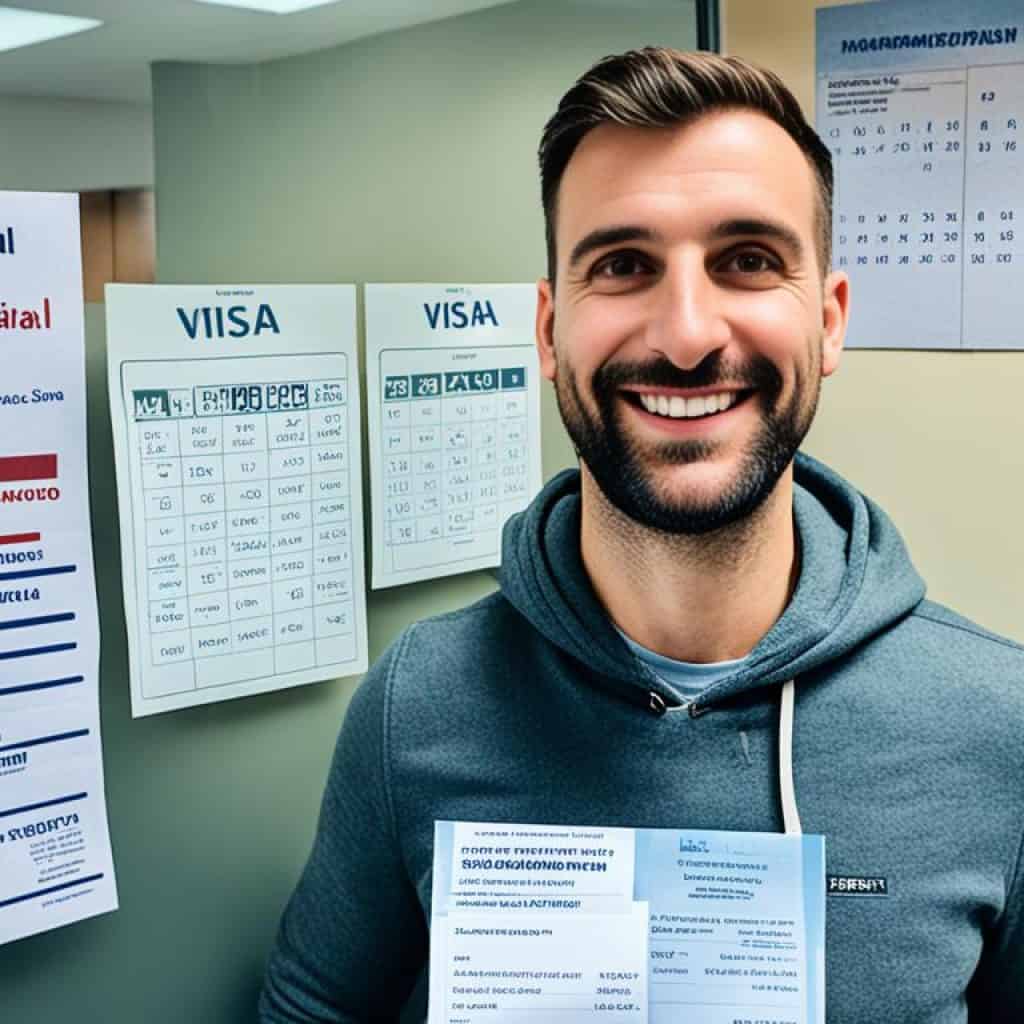Are you considering a move to the United States? If so, you may have come across the term “immigrant visa.” But what exactly is an immigrant visa, and how does it differ from other types of visas? In this article, we will explore the basics of the immigrant visa, its purpose, and the process of obtaining one. Whether you’re seeking permanent residency or simply curious about the immigration journey, read on to discover the key facts about the immigrant visa.
Key Takeaways:
- An immigrant visa allows individuals to travel to the US with the intention of living there permanently.
- It is different from a non-immigrant visa, which is temporary and does not grant permanent residency.
- Obtaining an immigrant visa is part of the process of obtaining a green card, which grants permanent resident status.
- Immigrant visas can be categorized into family-based, employment-based, humanitarian, and diversity visa lottery types.
- The process of obtaining an immigrant visa involves completing an application, attending an interview, and meeting specific eligibility requirements.
Understanding the Difference Between Immigrant Visas and Green Cards
While green cards and immigrant visas are often used interchangeably, it is important to recognize the distinctions between the two. An immigrant visa serves as the travel document that allows individuals to enter the United States with the intent of becoming permanent residents. On the other hand, a green card is the tangible proof of an individual’s permanent resident status.
The process to obtain an immigrant visa tends to be more comprehensive than obtaining a non-immigrant visa, and it typically involves sponsorship by a family member. Once in the United States, an immigrant visa holder has the opportunity to apply for a green card. Notably, green cards come in various categories, including family-based, employment-based, and humanitarian green cards.
Understanding these nuances between immigrant visas and green cards plays a vital role in navigating the immigration process effectively. Whether you are considering applying for an immigrant visa or seeking to adjust your status, a clear understanding of the differences will help you make informed decisions.
| Immigrant Visas | Green Cards |
|---|---|
| Serve as the travel document to enter the US | Physical proof of permanent resident status |
| Obtained before traveling to the US | Applied for once in the US with an immigrant visa |
| Involves being sponsored by a family member | Can be obtained through various categories |
| Part of the process for obtaining a green card | Provides permanent resident status |
By grasping the variances between immigrant visas and green cards, individuals can better comprehend the steps, requirements, and benefits associated with each. Obtaining an immigrant visa sets the foundation for pursuing permanent residency, while the green card confirms one’s status as a permanent resident of the United States.
Types of Immigrant Visas
Immigrant visas can be divided into different categories based on the purpose of travel and eligibility criteria. Understanding the various types of immigrant visas is essential for those considering permanent residency in the United States.
Family-based Visas
Family-based visas are designed for close relatives of U.S. citizens and green card holders. These visas allow parents, siblings, and children to join their family members in the United States. Family-based visas require sponsorship from a U.S. citizen or green card holder and demonstrate a close familial relationship.
Employment-based Visas
Employment-based visas are for individuals who have received job offers in the United States and are sponsored by their employers. These visas are categorized based on specific employment categories and require evidence of the job offer and qualifications. Employment-based visas contribute to the U.S. economy by attracting skilled workers from around the world.
Humanitarian Visas
Humanitarian visas provide protection and assistance to individuals who are facing persecution in their home countries. These visas are available to refugees, asylum seekers, and victims of human trafficking, crime, or abuse. Humanitarian visas offer an opportunity for individuals to seek safety and rebuild their lives in the United States.
Diversity Visa Lottery
The Diversity Visa Lottery, also known as the Green Card Lottery, is a program that randomly selects up to 50,000 individuals from countries with low rates of immigration to the United States. This program aims to promote diversity and provide opportunities for individuals from underrepresented regions to obtain permanent residency in the United States.
| Visa Type | Eligibility Criteria | Application Process |
|---|---|---|
| Family-based visas | Close relatives of U.S. citizens or green card holders | Sponsorship from a U.S. citizen or green card holder |
| Employment-based visas | Job offers in the U.S. with employer sponsorship | Submit application with supporting documents |
| Humanitarian visas | Refugees, asylum seekers, victims of human trafficking, crime, or abuse | Submit application with supporting documents and evidence |
| Diversity Visa Lottery | Random selection from countries with low immigration rates | Online application during the specified registration period |
The Process of Obtaining an Immigrant Visa
The process of obtaining an immigrant visa involves several important steps. Let’s take a closer look at each one:
1. Immigrant Visa Application
The first step in the process is to complete the immigrant visa application. This application is a crucial document that provides information about the applicant, including their personal details, purpose of travel, and eligibility for the visa. The completed application must be submitted to the US embassy or consulate in the applicant’s home country.
2. Immigrant Visa Interview
After submitting the application, the applicant will be scheduled for an immigrant visa interview. This interview serves as an opportunity for the consular officer to assess the applicant’s eligibility and evaluate the authenticity of the information provided. During the interview, the applicant may be asked questions related to their purpose of travel, ties to their home country, and the supporting documents they have submitted.
The immigrant visa interview is a vital step in the process as it allows the consular officer to determine whether the applicant meets all the eligibility requirements and whether their reasons for immigrating to the United States are valid.
3. Eligibility Requirements
Applicants must meet certain eligibility requirements to qualify for an immigrant visa. These requirements may vary depending on the type of visa being applied for. However, some common eligibility criteria include having a valid passport, proof of funds to support oneself in the US, and in some cases, a valid job offer.
4. Document Submission
Along with the visa application, applicants are required to submit supporting documents to the embassy or consulate. These documents may include proof of identity, proof of relationship (in the case of family-based visas), financial documents, and any other relevant documents that may be necessary to prove eligibility.
It is important for applicants to review the specific requirements for their chosen visa category and ensure that all required documents are submitted accurately and in a timely manner.

5. Visa Processing Time
The processing time for an immigrant visa can vary depending on factors such as the type of visa, the applicant’s country of residence, and the current workload of the embassy or consulate. On average, it may take several months to over a year for an immigrant visa application to be processed. It is important for applicants to plan their immigration journey accordingly and submit their applications well in advance of their intended travel date.
6. Visa Approval and Issuance
Once the consular officer has reviewed the application, conducted the interview, and verified all necessary documents, a decision will be made regarding the approval of the immigrant visa. If the visa is approved, it will be issued to the applicant, allowing them to travel to the United States and pursue their intended purpose of travel, such as joining family members or starting a new job.
It is important to note that the immigrant visa does not represent permanent residency or a green card. The immigrant visa serves as a means to enter the United States, and once in the country, the visa holder must apply for a green card to obtain permanent resident status.
The process of obtaining an immigrant visa can be complex and time-consuming. It is recommended that applicants seek guidance from immigration professionals and utilize available resources to ensure a smooth and successful application process.
Requirements for Immigrant Visas
Obtaining an immigrant visa requires meeting specific requirements based on the type of visa and the purpose of travel. These requirements ensure that applicants are eligible and prepared for their journey to the United States. While the criteria may vary, there are some fundamental prerequisites that all applicants must fulfill:
- Valid Passport: A current and unexpired passport is essential for the visa application process.
- Funds for Support: Applicants should demonstrate adequate financial resources to support themselves during their stay in the US.
- Job Offer (for Employment-Based Visas): If applying for an employment-based immigrant visa, a valid job offer is typically required.
In addition to these basic requirements, there might be additional criteria depending on the visa type. Some examples include:
- Proof of Ties to Home Country: Certain immigrant visas may require applicants to demonstrate strong ties to their home country, ensuring that they have intentions to return after their authorized stay in the US.
- Medical Examination: Some visas necessitate a medical examination to ensure applicants meet health requirements.
- Criminal Background Check: As part of the visa process, applicants may need to undergo a criminal background check to ensure their eligibility for immigration purposes.
It is crucial for prospective immigrants to familiarize themselves with the specific criteria for each visa type before submitting their applications. By understanding and meeting the requirements, applicants can increase their chances of a successful visa application process.
Quote:
“Meeting the requirements for an immigrant visa is an important step towards realizing your dream of living in the United States. Take the time to thoroughly research and ensure that you meet all the necessary criteria. By doing so, you’ll be on your way to embarking on an exciting new chapter in your life.” – Immigration Expert
Benefits of an Immigrant Visa
Obtaining an immigrant visa and eventually a green card can provide numerous benefits to individuals seeking to establish permanent residency in the United States.
“Having an immigrant visa opens up a world of opportunities for individuals who dream of building a life in the US. It is an important step towards gaining stability, security, and access to a multitude of benefits.”
One of the primary benefits of an immigrant visa is the ability to live and work permanently in the US. This offers a sense of security and stability by providing a legal pathway to establish roots and build a future in the country.
Furthermore, immigrant visa holders have the freedom to travel within the US without the need for additional visas or permissions. This allows them to explore the diverse landscapes, experience different cultures, and take advantage of the many opportunities available throughout the country.
Additionally, immigrants with an immigrant visa are eligible for a wide range of social and government benefits. These benefits include access to education, healthcare, and various social assistance programs. Immigrant visa holders can also participate in the US labor market, pursue higher education, and contribute to the economy.
Moreover, an immigrant visa serves as a stepping stone towards US citizenship. After maintaining permanent resident status for a specified period of time, immigrants can apply for naturalization. This process allows them to enjoy the full benefits of being a US citizen, such as voting rights and eligibility for certain government positions.
It is important to note that while an immigrant visa provides a path to permanent residency, it does not guarantee automatic citizenship. However, it sets individuals on the right path to potentially achieve their long-term goal of becoming US citizens.
| Benefits of an Immigrant Visa | Description |
|---|---|
| Permanent residency | Allows individuals to establish roots and build a life in the US |
| Freedom to travel | Enables unrestricted travel within the US |
| Access to social and government benefits | Entitles immigrants to education, healthcare, and social assistance programs |
| Path to US citizenship | Opens doors to pursuing naturalization and enjoying full citizenship rights |
Having an immigrant visa grants individuals incredible opportunities to start a new chapter in their lives, providing access to the vast benefits that come with permanent residency in the United States.
Renewal and Revocation of Immigrant Visas
Immigrant visas themselves do not need to be renewed, as they are valid for a single entry into the US. However, green cards, which are obtained after entering the US with an immigrant visa, need to be renewed every 10 years.
Renewing your green card is essential to maintain your permanent resident status in the United States. It ensures that you can continue to live, work, and travel freely within the country.

During the renewal process, applicants must provide updated information and supporting documents to demonstrate their continued eligibility. This may include proof of address, employment, and financial stability. It is crucial to submit the renewal application well in advance to avoid any interruptions in your legal status.
Revocation of Immigrant Visas
While immigrant visas provide a pathway to permanent residency, they can be revoked under certain circumstances.
“It is important for immigrants to adhere to US laws and regulations to maintain their immigration status.”
Instances that may lead to the revocation of an immigrant visa include committing a serious crime, engaging in fraud or misrepresentation during the immigration process, or violating the terms and conditions of the visa.
If your immigrant visa is revoked, you could face deportation and the loss of your green card. It is essential to understand and follow the laws and regulations of the United States to protect your immigration status and ensure a successful and secure future.
“Protect your immigration status by complying with US laws and regulations.”
Studying in the US on an Immigrant Visa
Immigrant visas not only provide the opportunity for individuals to live and work permanently in the US, but they can also be utilized for studying purposes. If you aspire to pursue higher education in the US, you may apply for an immigrant visa, provided you have been sponsored by a family member or have received a valid job offer.
The requirements and application process for obtaining an immigrant visa for studying may vary depending on the educational institution and program of study you intend to pursue. It is crucial for prospective students to thoroughly research and comprehend the specific requirements to ensure a smooth and successful application process.
Study Abroad Opportunities on an Immigrant Visa
- Access to Prestigious Universities: Obtaining an immigrant visa opens doors to some of the world’s top universities in the US, allowing you to immerse yourself in a diverse academic environment.
- Quality Education: The US is renowned for its high-quality education system, offering a wide range of programs and courses across various disciplines.
- Cultural Exchange: Studying in the US provides unique opportunities for cultural exchange, allowing you to connect with students from different backgrounds and perspectives.
- Career Advancement: A degree from a US institution can enhance your career prospects, as US qualifications are highly regarded by employers worldwide.
âStudying in the US on an immigrant visa enables you to pursue academic excellence, gain valuable experiences, and broaden your horizons.â
Remember to consult the educational institution you wish to attend for comprehensive information on the application process, including any specific documentation required to demonstrate your eligibility for an immigrant visa.
| Benefits of Studying in the US on an Immigrant Visa | Requirements |
|---|---|
|
|
Immigrant Visa Processing Times
When planning your journey to the United States, it is important to consider the processing times for immigrant visas. These times can vary depending on several factors, such as the type of visa you are applying for, your country of residence, and the current backlog of applications.
On average, it can take several months to over a year for an immigrant visa application to be processed. The length of time can be influenced by various factors, including the complexity of your case and the volume of applications being processed at the time.
To ensure a smooth and timely process, it is advised to submit your application well in advance of your intended travel date. This will give you ample time for any additional documentation or interviews that may be required.
While waiting for your immigrant visa to be processed, it is important to stay informed and prepared. Keep track of the progress of your application and check for any updates or requests for additional information from the US embassy or consulate.
Factors Affecting Immigrant Visa Processing Times:
- The type of visa you are applying for
- Your country of residence
- The current backlog of applications
- The complexity of your case
Note: The processing times provided are averages and can vary based on individual circumstances. It is advisable to consult with your local US embassy or consulate for the most up-to-date processing time estimates.
By understanding the immigrant visa processing times and planning accordingly, you can ensure a smoother and more predictable immigration journey.
Fees Associated with Immigrant Visas
When applying for an immigrant visa, it’s important to understand the fees and costs involved. The total amount can vary depending on the type of visa you are applying for and your individual circumstances. In addition to the visa application fee, there are other expenses that you may need to budget for. These can include medical examinations, document translations, and other necessary fees.
Here is an overview of the potential fees associated with the immigrant visa process:
| Fee | Amount |
|---|---|
| Visa Application Fee | $X |
| Medical Examination | $X |
| Document Translations | $X |
| Other Necessary Expenses | $X |
It’s important to note that these fees are subject to change, so it’s recommended to check the latest fee schedule on the U.S. Department of State’s official website. By budgeting for these fees and expenses in advance, you can ensure that you are financially prepared for the immigrant visa application process.

For more detailed information about the specific fees associated with your visa type, it’s advisable to consult with an immigration attorney or refer to the official resources provided by the U.S. government. They can provide you with accurate and up-to-date information regarding the costs involved in obtaining an immigrant visa.
Resources for Immigrant Visa Applicants
When it comes to applying for an immigrant visa, having access to reliable resources and assistance can make a significant difference in navigating the complex application process. Fortunately, there are several helpful resources available to ensure that applicants have the support they need every step of the way.
Government Websites
One of the most valuable sources of information for immigrant visa applicants is the US Department of State’s official website. Here, you can find detailed information about the visa application process, eligibility requirements, and necessary forms. The US Citizenship and Immigration Services (USCIS) website is another essential resource, providing up-to-date information on immigration policies and procedures.
Immigration Attorneys
For individuals who prefer personalized guidance and expertise, consulting with an immigration attorney can be highly beneficial. These professionals specialize in immigration law and can provide tailored advice based on individual circumstances. Immigration attorneys can help applicants understand the requirements, prepare the necessary documentation, and navigate any potential challenges that may arise during the application process.
Organizations and Online Platforms
There are also many nonprofit organizations and online platforms that offer valuable assistance and guidance to immigrant visa applicants. These resources often provide detailed guides, checklists, and FAQs to help individuals understand the process better. They may also offer forums or communities where applicants can connect with others going through a similar journey, providing a supportive network and valuable insights.
Whether you choose to utilize government websites, consult with an immigration attorney, or turn to organizations and online platforms, it is crucial to take advantage of the available resources. These resources can provide clarity, answer questions, and ensure that you complete all the necessary steps accurately and efficiently, making your immigrant visa application experience more manageable and increasing your chances of success.
Maintaining Legal Status with an Immigrant Visa
Once an individual enters the US with an immigrant visa, it is important for them to maintain their legal status. This includes adhering to US immigration laws and regulations, reporting any changes in address or employment, and renewing their green card when necessary. Failure to maintain legal status can result in the loss of immigration benefits and potential removal from the US. It is crucial for immigrants to understand and fulfill their legal obligations to ensure a successful immigration journey.
Adhering to US immigration laws and regulations is essential for immigrants to maintain their immigration status and enjoy the benefits of their immigrant visa. It is important to familiarize yourself with the specific laws and regulations related to your immigrant visa category and comply with them.
Some of the key legal obligations that immigrants must fulfill include:
- Reporting changes in address: Immigrants are required to report any change in their residential address to the US Citizenship and Immigration Services (USCIS) within 10 days of moving. This can be done by filing Form AR-11, Alien’s Change of Address. Failing to report address changes can have serious consequences and may lead to the loss of immigration benefits.
- Reporting changes in employment: Immigrants with a work-based immigrant visa must report any changes in their employment to the USCIS. This includes changes in employer, job position, or work location. Failure to report such changes can put an immigrant’s legal status at risk.
- Renewing your green card: Green cards are usually valid for 10 years, and it is important to renew them before they expire. Failing to renew a green card can result in the loss of permanent residency and may lead to removal proceedings.
By maintaining their legal status, immigrants can continue to enjoy the benefits of their immigrant visa, such as the ability to live and work permanently in the US, access government services and programs, and eventually pursue a path to US citizenship.
| Benefits of Maintaining Legal Status |
|---|
| 1. Ability to live and work permanently in the US. |
| 2. Access to government services and programs. |
| 3. Protection against removal and deportation. |
| 4. Pursuit of US citizenship through naturalization. |
It is important to note that maintaining legal status is not only a requirement but also a responsibility. Immigrants have an obligation to respect and follow the laws of their adopted country, which includes fulfilling their legal obligations as visa holders. By doing so, immigrants can ensure a successful and fulfilling immigration journey in the United States.
Adjusting Status from an Immigrant Visa to US Citizenship
After residing in the US for a certain period of time as a permanent resident, immigrant visa holders have the opportunity to adjust their status and apply for US citizenship. This process, known as adjusting status, allows individuals to transition from being a permanent resident to a full-fledged citizen of the United States.
In order to qualify for adjusting status, immigrant visa holders must meet certain eligibility criteria set by the US Citizenship and Immigration Services (USCIS). These criteria typically include:
- Residency requirements: Immigrant visa holders must have continuously resided in the US for a specific number of years as permanent residents. The exact requirement varies depending on the circumstances and the immigrant visa category.
- Physical presence requirements: Along with meeting residency requirements, applicants must also demonstrate that they have physically been present in the US for a significant portion of the residency period.
- English and civics test: As part of the application process, individuals must pass an English language proficiency test and a civics test. The English test assesses the applicant’s ability to read, write, and speak English, while the civics test evaluates their knowledge of US history and government.
- Good moral character: The USCIS takes into consideration an applicant’s character and conduct during the residency period. It is essential for individuals to maintain good moral character, as certain criminal activities or violations may hinder the adjustment of status process.
The specific requirements and application process for adjusting status can vary depending on individual circumstances, such as the immigrant visa category and any applicable waivers. Therefore, it is recommended for immigrants to consult with immigration professionals or reliable resources for accurate and up-to-date information tailored to their specific situation.
Adjusting status from an immigrant visa to US citizenship is a significant milestone for individuals seeking to fully integrate into American society. It grants them the rights and privileges of being a US citizen, including the ability to vote in elections, hold certain government positions, and obtain a US passport for international travel.
“Becoming a US citizen through the adjustment of status process is not only a personal achievement but also a testament to the strong values and contributions that immigrants bring to this country.”
Throughout the adjustment of status journey, it is important for immigrants to stay informed, adhere to US laws and regulations, and maintain their legal status. By following the necessary steps and requirements, immigrants can successfully navigate the path to US citizenship and fully embrace the opportunities and benefits that come with it.
Immigration Reform and Changes to the Immigrant Visa Process
The US immigration system is constantly evolving, undergoing reforms and changes that can have a significant impact on the immigrant visa process. Staying informed about these updates and policy changes is crucial for prospective immigrants, as it can greatly affect their immigration journey. By keeping up to date with the latest developments, individuals can better navigate the process and make informed decisions.
Regularly checking government websites, such as the US Department of State and US Citizenship and Immigration Services, is a valuable resource for staying informed about immigration reform. These websites provide up-to-date information on policy changes, eligibility criteria, and procedural updates. Additionally, news sources covering immigration news can provide insights into the latest reforms and changes to the immigration system.
Consulting with immigration professionals is another effective way to stay updated on immigration reform and visa process changes. Immigration attorneys and experts can provide guidance on how these changes may impact individual cases and offer advice on the best course of action. They can also help immigrants understand their rights, obligations, and options in light of any new policies.
Importance of Understanding Immigration Reform
Understanding the current immigration landscape is vital for individuals navigating the immigrant visa process. Policy changes and reforms can affect visa categories, eligibility criteria, processing times, fees, and documentation requirements. By staying informed, prospective immigrants can plan their immigration journey more effectively and make timely decisions to optimize their chances of success.
“Immigration reform has the potential to create new opportunities and challenges for aspiring immigrants. It is essential to remain proactive and informed to navigate the evolving immigration landscape effectively.”
Key Considerations and Adaptation
It is important to adapt to any changes in immigration policies and adjust strategies accordingly. Here are some key considerations for immigrants:
- Review eligibility criteria: Changes in immigration policies may impact eligibility criteria for certain visa categories. Stay informed to ensure all requirements are met.
- Plan ahead: Processing times and application procedures may change due to reform measures. It is crucial to plan ahead to account for potential delays and ensure timely submission of applications.
- Consult professionals: Immigration attorneys and experts can provide valuable insights and guidance tailored to individual circumstances. Seek their assistance to navigate the evolving immigration landscape successfully.
Conclusion
Immigrant visas offer a vital pathway to achieving permanent residency and the potential for US citizenship. Understanding the process, requirements, and benefits of an immigrant visa is crucial for individuals who aspire to live and work in the United States. By following the necessary steps and seeking guidance from immigration professionals, applicants can navigate the immigration journey successfully and open a new chapter in their lives.
Immigrant visas provide a gateway to opportunities for individuals and families to build a better future in the US. These visas not only grant the privilege of living and working permanently in the country but also offer access to a range of social and government benefits. It’s essential for applicants to stay informed about updates and changes to the immigration system, ensuring they are well-prepared throughout the visa application process.
Utilizing available resources and seeking assistance from immigration professionals can greatly contribute to a smooth and accurate application process. It is advised to stay updated with the latest information provided by government websites and reliable news sources. By understanding the immigration landscape and fulfilling legal obligations, applicants can navigate the pathway to an immigrant visa successfully, bringing them closer to achieving their goals and dreams in the land of opportunity.
FAQ
What is an immigrant visa?
An immigrant visa is a type of visa that allows individuals to travel to the United States with the intention of living there permanently.
What is the difference between an immigrant visa and a green card?
An immigrant visa is the document that allows individuals to enter the US with the intention of becoming permanent residents, while a green card is the physical card that proves an individual’s permanent resident status.
What are the types of immigrant visas?
The types of immigrant visas include family-based visas, employment-based visas, humanitarian visas, and diversity visa lottery.
How can I obtain an immigrant visa?
The process of obtaining an immigrant visa involves completing an application and attending an interview at the US embassy or consulate in your home country.
What are the requirements for immigrant visas?
The requirements for immigrant visas vary depending on the type of visa, but generally include a valid passport, proof of funds, and in some cases, a valid job offer.
What are the benefits of an immigrant visa?
Immigrant visa holders can live and work permanently in the US, travel freely within the country, and access social and government benefits. They can also pursue US citizenship after a certain period of time.
Do immigrant visas need to be renewed?
Immigrant visas themselves do not need to be renewed, but green cards, which are obtained after entering the US with an immigrant visa, need to be renewed every 10 years.
Can I study in the US on an immigrant visa?
Yes, students can study in the US on an immigrant visa if they have been sponsored by a family member or have a valid job offer.
How long does it take to process an immigrant visa?
The processing times for immigrant visas can vary, but on average it can take several months to over a year for an application to be processed.
Are there fees associated with applying for an immigrant visa?
Yes, there are fees associated with applying for an immigrant visa, including the visa application fee and other necessary expenses such as medical examinations and document translations.
Where can I find resources for immigrant visa applicants?
There are government websites such as the US Department of State and USCIS, as well as immigration attorneys and organizations that offer assistance and guidance for immigrant visa applicants.
How can I maintain legal status with an immigrant visa?
To maintain legal status, individuals with an immigrant visa must adhere to US immigration laws, report any changes in address or employment, and renew their green card when necessary.
Can I adjust my status from an immigrant visa to US citizenship?
Yes, after residing in the US for a certain period of time as a permanent resident, immigrant visa holders may be eligible to apply for US citizenship through a process called adjustment of status.








Add comment